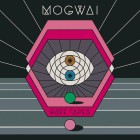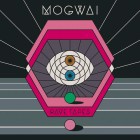Music Nerd: (Mostly) Instrumental Picks
 Rave Tapes by Mogwai
Rave Tapes by Mogwai
Mogwai are not a band who reinvent themselves with every album; each one is more of a continued refinement of their particular mostly-instrumental post-rock sound than a radical departure. For me, their albums are distinguished more by their overall mood. The mood established here, by opening track Heard About You Last Night, is one of often quiet reflection, ushered in by echoing, chiming synth tones. Those synths set up the rest of the album in another way too: there’s a much greater emphasis on electronic texture here than in past albums. The crunchy bass and guitar melodies Mogwai is known for are still present throughout, but it’s the synthesizers that really take center stage.
The first two tracks are pleasant background music, but it’s track three where this album really grabbed me. Right about the three minute mark, the steadily-building churn of Remurdered is joined by a rollicking synthesizer line (which reminds me a bit of the big payoff in LCD Soundsystem’s Dance Yrself Clean, though more menacing and less danceable) and rumbling bass that really kicks the track, and the album, up to another level. The very next track, Hexon Bogon is a classic slab of Mogwai-brand rock, which should satisfy any purists longing for some straightforward bombast. In its mood and intensity, this album reminds me in many places of their earlier standout Happy Songs for Happy People. If you weren’t familiar with Mogwai before this album and like what you hear, that would be a perfect next step into the waters of their discography.
 Immunity by Jon Hopkins
Immunity by Jon Hopkins
I listen to a lot of ambient music, though if I’m being honest, I don’t listen to most ambient albums all the way through: I tend to listen to them as I fall asleep. That’s not really an insult though. Ambient music, as defined by its godfather the great Brian Eno (you’ll probably see me mention him quite a bit in these posts.) is music that is “able to accommodate many levels of listening attention without enforcing one in particular; it must be as ignorable as it is interesting." This album by recent Eno collaborator Jon Hopkins certainly ticks those boxes. Is it great background music? Absolutely. But it’s also many-layered music that rewards close attention, should you decide to focus in a little more.
There’s no danger of falling asleep here though, at least, not at first. Opening track We Disappear starts off quietly, with what sounds like someone opening a door and walking into the studio--a sound that lets you know that there is a human being at the controls of all the machines you’re about to hear. Then a steady beat begins, with a glitchy skitter over the top of it. From here the track picks up momentum and layers as it goes along, moving the listener forward with it, until it reaches a break around the three-and-a-half minute mark (or about two minutes into the live version I linked above). Then it’s as if the rocket you’ve been riding in has finally breached Earth’s atmosphere, and you are floating in space as it sheds its stages. The rest of this album follows a pretty similar trajectory to this first song. The next three tracks feature more of those propulsive beats moving us forward with them, until we get to Abandon Window, which begins with a lone piano reverberating a sequence of chords that is gradually overtaken by a chorus of drones. We’ve reached the “floating in space” section of the album itself. Okay, so maybe you could fall asleep to the last half of this record. You’ll probably have some beautiful dreams if you do.
Have you listened to either of these albums? What did you like about them, what did you not like? Let me know!












